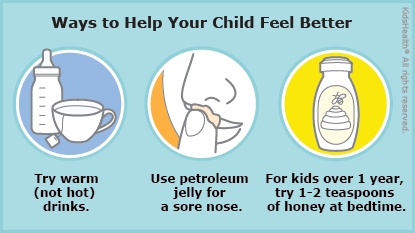A Cold: How to Care for Your Child
Children with a cold may have a runny or stuffy nose, sneezing, a cough, a sore throat and a low fever. Viruses (a type of germ) cause colds. Antibiotics don't work against viruses, so they can't treat colds. An antibiotic will not make your child feel better, help your child get better faster, or prevent the spread of a cold.
It takes 1–2 weeks for a cold to go away. You can help your child feel more comfortable while he or she gets better.


-
Give your child plenty of liquids. Warm liquids (such as chicken broth or herbal tea) can be soothing.
-
To help with a runny or stuffy nose:
-
Run a cool-mist humidifier. Clean after each use.
-
For babies: Put a few drops of saline (saltwater) into the nose, then gently suction the mucus out with a bulb syringe.
-
For older kids: Give 2 sprays of saline nose spray 3 times a day for 4 days.
-
If the skin under your child's nose is sore, put petroleum jelly (Vaseline® or a store brand) on it.
-
For children older than 12 months, you can give 1–2 teaspoons of honey at night to help with coughing. Do not give honey if your child is younger than 12 months.
-
For children older than 6 years, try a hard candy or throat lozenge to help ease throat pain and coughing.
-
Do not give any cough or cold medicines to children younger than 12 years. These medicines can cause serious side effects.
-
Do not give antihistamines (such as Benadryl® or a store brand) to a child of any age. Antihistamines do not help kids with colds feel better.
-
If your child has a fever or seems uncomfortable and your health care provider says it's OK, you can give acetaminophen (such as Tylenol® or a store brand) to children older than 3 months OR ibuprofen (such as Advil®, Motrin® or a store brand) to children older than 6 months. When giving these medicines:
-
Give the exact dose as recommended by your health care provider.
-
Do not give acetaminophen more than 4 times in a 24-hour period.
-
Be sure there's no acetaminophen or ibuprofen in any other medicines your child is taking. Getting too much acetaminophen or ibuprofen can be very dangerous.
-
Do not give aspirin to your child. It could lead to serious medical problems.
-
Talk to your health care provider before giving your child any supplements or vitamins.

Your child:
-
has a fever that lasts for more than 3–4 days
-
won't drink
-
seems dehydrated; signs include a dry or sticky mouth, sunken eyes, crying with few or no tears, or peeing less often (or having fewer wet diapers)
-
has ear pain or fluid coming out of the ear
-
has red eyes or yellow fluid coming from the eyes
-
has a runny or stuffy nose for 2 weeks or longer
-
has a bad cough or chest pain
-
is getting sicker


How do colds spread to others? Colds can spread when:
-
A person with a cold coughs and/or sneezes the virus into the air, and someone else breathes it in.
-
A virus gets in the eyes, nose or mouth. This can happen by touching someone who has a cold, or by touching a hard surface (like a doorknob) that has the virus on it, and then touching your eyes, mouth or nose.
How can we prevent getting colds? To protect your family from colds:
-
Teach everyone to wash their hands well and often using soap and water. They should scrub for at least 20 seconds, then rinse and dry thoroughly. This is especially important after coughing or sneezing, and before and after eating. If soap and water are not available, use a hand sanitizer with at least 60 percent alcohol.
-
Clean tabletops, doorknobs and other hard surfaces with a cleaner that kills viruses.